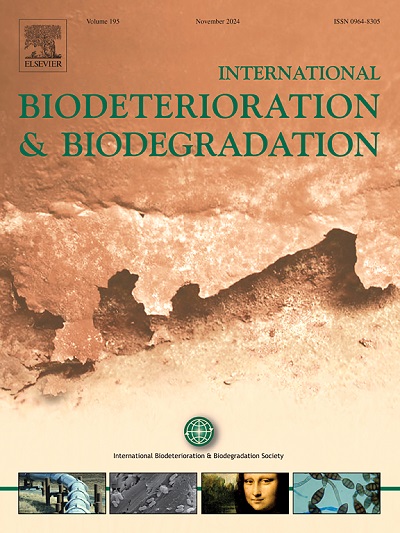烃类环境中革兰氏阳性菌生物传感和分化的新型生物识别元件(BREs)
IF 4.1
2区 环境科学与生态学
Q2 BIOTECHNOLOGY & APPLIED MICROBIOLOGY
International Biodeterioration & Biodegradation
Pub Date : 2025-06-05
DOI:10.1016/j.ibiod.2025.106130
引用次数: 0
摘要
燃料和燃料系统中微生物的过度生长可能导致生物结垢和生物腐蚀,因此早期检测至关重要。在革兰氏阳性和革兰氏阴性细菌普遍存在的环境中,已经从暴露于碳氢化合物的环境中分离出了广泛的系统发育和代谢多样化的微生物。这项工作的目的是鉴定特异性的基于生物标志物的生物识别元件(BREs),用于检测碳氢化合物降解革兰氏阳性细菌。我们使用了两个对革兰氏阳性细菌具有保守性和特异性的细菌表面靶点,即脂壁酸(LTA)和来自西氏戈登菌的细胞壁相关分泌蛋白fasiclin 1 (FASC1)的短表面表位区域。利用噬菌体展示技术发现了几种基于肽的配体,用于检测燃料中大量的革兰氏阳性细菌,并利用微尺度热泳(MST)和Western blot分析验证了这些肽在碳氢化合物存在下与革兰氏阳性细菌的结合。结合肽与量子点结合,在靶微生物和非靶微生物存在的情况下,通过荧光成像和荧光分析表征其对革兰氏阳性菌的特异性。结果表明,喷气燃料不会干扰细菌中肽与目标生物标志物的结合,表明这些BREs适合用于富碳氢环境中检测革兰氏阳性细菌的生物传感器的功能化。本文章由计算机程序翻译,如有差异,请以英文原文为准。
Novel bio-recognition elements (BREs) for biosensing and differentiation of Gram-positive bacteria in hydrocarbon environments
Excessive microbial growth in fuel and fuel systems can lead to biofouling and biocorrosion, which makes early detection crucial. A wide range of phylogenetically and metabolically diverse microorganisms have been isolated from environments exposed to hydrocarbons with Gram-positive and Gram-negative bacteria being ubiquitous. The aim of this work was to identify specific biomarker-based bio-recognition elements (BREs) for sensing hydrocarbon-degrading Gram-positive bacteria. We used two bacterial surface targets that are conserved and specific for Gram-positive bacteria, Lipoteichoic acid (LTA) and a short surface-epitope region from the cell wall-associated secreted protein Fasciclin 1 (FASC1), from Gordonia sihwensis. Several peptide-based ligands to detect numerous Gram-positive bacteria in fuel were discovered by using phage display technology and the binding of these peptides to Gram-positive bacteria in the presence of hydrocarbons was validated using Microscale Thermophoresis (MST) and Western blot analysis. The binding peptides were conjugated to quantum dots and their specificity to Gram-positive bacteria was characterized by fluorescence imaging and fluorometric analysis in the presence of target and non-target microorganisms. It was shown that jet fuel did not interfere with binding of the peptides to the target biomarker in the bacteria, indicating that these BREs are suitable for functionalization of biosensors for detection of Gram-positive bacteria in hydrocarbon rich environments.
求助全文
通过发布文献求助,成功后即可免费获取论文全文。
去求助
来源期刊
CiteScore
9.60
自引率
10.40%
发文量
107
审稿时长
21 days
期刊介绍:
International Biodeterioration and Biodegradation publishes original research papers and reviews on the biological causes of deterioration or degradation.

 求助内容:
求助内容: 应助结果提醒方式:
应助结果提醒方式:


